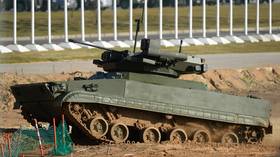2020 worst year on record for UK cancer diagnosis as NHS overwhelmed by Covid-19
The UK has recorded its worst year on record for cancer diagnosis as the coronavirus pandemic hit the National Health Service (NHS), according to official statistics, sparking fears over the care cancer patients receive.
In December 2020, the NHS recorded 200,940 urgent cancer referrals in England, compared to 187,811 during the previous year. The increase in the figures is thought to have been caused by referrals that were delayed during the first wave of the Covid-19 pandemic, when non-emergency care was suspended over concerns that the NHS would be overwhelmed and patients would be unnecessarily exposed to the virus.
NHS clinical radiologist, Dr. Julian Elford, warned that the pandemic had meant medical professionals “can’t get patients through the pathway as quickly as we’d like."
It is frustrating and that is leading to some delays in diagnosis and treatment.
The NHS also chose to delay procedures, if possible, as they didn’t want to put cancer patients at risk of catching Covid-19 by making unnecessary trips to hospitals.
Also on rt.com The healthcare system isn’t interested in anything other than Covid… not even lung cancerAlongside the number of individuals who were given urgent cancer referrals, around 350,000 patients in England have waited longer than the six-week target for a key diagnostic test. A year prior, in December 2019, the figure was only 41,906.
Elford highlighted how the UK was already behind Europe in terms of the equipment and staff available to process patients, calling for more scanners and qualified radiologists and radiographers.
Health Secretary Matt Hancock recently announced reforms to reduce bureaucracy. Elford noted how these would help the NHS to speed up the process, stating that any reduction in red tape “will help to ease the burden as we go forward.”
Think your friends would be interested? Share this story!













